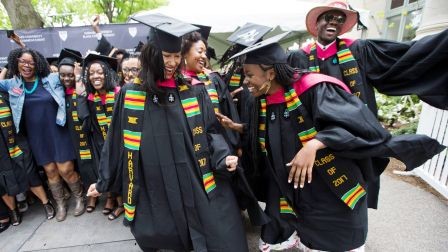Affinity Graduation ceremonies in 2025 are making headlines nationwide, not just for their emotional impact, but for how students and communities are rallying to preserve them. As institutions revise their policies around diversity and inclusion, students are taking ownership of these meaningful traditions—transforming them into symbols of resistance, unity, and pride.
These ceremonies, created to honor the unique challenges and accomplishments of students from underrepresented groups—such as Black, Latinx, Indigenous, Asian, LGBTQ+, and first-generation graduates—are being reimagined across campuses. In a year marked by policy shifts and funding cuts, Affinity Graduation has become more than just a celebration; it’s a statement.
Students Take the Lead on Affinity Graduation Ceremonies
This year, students are not just attending these ceremonies—they’re planning, hosting, and fundraising for them. In many universities, official support for these events has been reduced or withdrawn. But that hasn’t stopped students from stepping up.
Here’s how students are driving the change:
- Organizing independent celebrations without university sponsorship
- Collaborating with alumni networks and community leaders for funding
- Expanding participation across intersectional identities
- Creating new traditions like cultural attire, heritage performances, and personalized awards
This student-led movement has infused Affinity Graduation with a renewed sense of purpose. It’s now not only about celebrating personal milestones, but also about reclaiming space in academic institutions that haven’t always embraced every identity.
Institutions Rethink Their Role in Affinity Graduation
Universities across the country are undergoing a shift in how they approach identity-based programming. Amid increasing scrutiny over DEI-related initiatives, many institutions are choosing to scale back official involvement in affinity-based ceremonies. However, they still face pressure from students, faculty, and alumni to support inclusive traditions.
Some key institutional changes observed in 2025:
- Funding for identity-based events has been cut or redirected
- Official messaging focuses on “unified” or “community-wide” graduation themes
- Staff previously tasked with coordinating affinity ceremonies have been reassigned
- New regulations have forced some institutions to decentralize identity-based celebrations
While some administrations see this as a compliance measure, many students view it as a step back from commitments to inclusion. As a result, the push for student-run Affinity Graduation ceremonies has only grown stronger.
Why Affinity Graduation Still Matters
In a world where representation and acknowledgment still lag behind, Affinity Graduation ceremonies provide more than symbolic gestures—they offer belonging. For many graduates, these events are the only spaces where their full identity is seen, respected, and celebrated without compromise.
Key reasons why these ceremonies remain vital:
- Emotional validation: They honor cultural heritage and lived experiences
- Representation: Students get to see leaders, faculty, and peers from similar backgrounds on stage
- Community building: These events connect students across classes and generations
- Legacy creation: They establish traditions that inspire underclassmen to persist
Whether it’s the draping of a cultural stole, a spoken-word performance in native language, or the calling of family members on stage, these personal touches are what make Affinity Graduation unforgettable.
The Future of Affinity Graduation
Looking ahead, Affinity Graduation is poised to continue growing outside the traditional university structure. What started as school-sponsored events may evolve into full-scale community collaborations supported by local organizations, cultural groups, and independent foundations.
Possible future trends include:
- Hybrid or virtual formats to increase accessibility
- Citywide or regional affinity graduations involving multiple schools
- Partnerships with cultural institutions for event hosting
- Integration of advocacy and activism components
The power of these ceremonies lies in their adaptability. Even as policies change and funding is questioned, the spirit behind Affinity Graduation remains untouchable. It is deeply rooted in the hearts of those it serves.
Support the future of Affinity Graduation by sharing these stories, volunteering at events, donating to student organizers, or simply showing up. The presence and recognition of identity-based achievements should never be optional—they are essential.
Let’s ensure that these celebrations thrive, evolve, and remain a cherished part of the academic journey.
